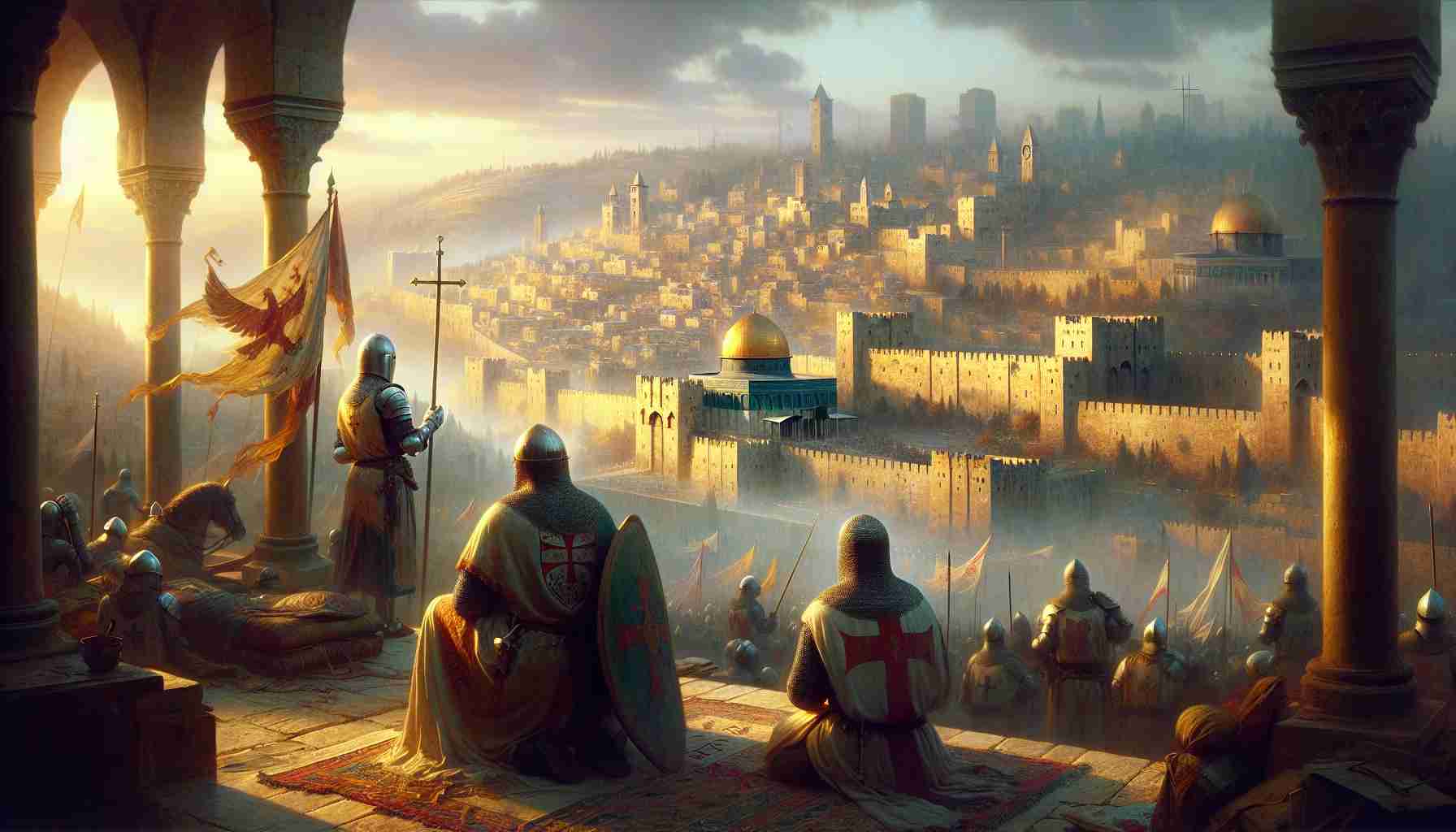

The heavy sun beat down on the ancient stones of Jerusalem, turning the dust into gold beneath the feet of thousands. Cries of war echoed across the fortified walls, shouts in Latin and French pierced by the moan of horns and the clang of steel. It was the fifteenth day of July in the year of our Lord 1099.
From the Mount of Olives to the Damascus Gate, the holy city braced for ruin.
Men from distant lands scaled the walls like ants upon a flame. The Franks, the Normans, the Lombards—they had marched for three years through pestilence and desert, across Anatolia and Syria, under the banner of Christ. Some dreamed of glory. Others sought penance. All bore a singular vow: to reclaim the city where Christ had walked, suffered, died, and rose.
Bishop Adhémar had once spoken of Psalm 122:6—“Pray for the peace of Jerusalem: they shall prosper that love thee.” The men remembered the words as they carved peace from chaos.
Atop a siege tower gilded with the cross, Godfrey of Bouillon stood, mail clinking, eyes fixed on the city’s battlements. His limbs trembled—not from fear, but from the burden of prophecy. He had not taken this oath to become a king, for he would utter later, “I will not wear a crown of gold in the city where my Savior wore a crown of thorns.” But this day, the blade must lead.
With a final push under the rising sun, the tower breached the northern wall near St. Stephen’s Gate. Jerusalem, the navel of the world, fell open like a wound.
Then came the violence.
Mosques turned to tombs. The Dome of the Rock—where Muslims believed Muhammad ascended to heaven—ran with blood. The Church of the Holy Sepulchre, once defiled, now reclaimed, rang with chants and sobs from men who fell to their knees, overcome by the view of the Empty Tomb. Some wept from joy. Others from horror.
The chroniclers say the bodies clogged the streets, the horses waded knee-deep in crimson. Contemporary sources differ—some claim the massacre was total, others write the slaughter spared certain groups. But none dispute the carnage that befell the city held sacred by three faiths.
Yet in the midst of ruin, a paradox bloomed.
On the Temple Mount, within the Al-Aqsa compound, Godfrey established his court. The ancient corridors, once echoing with the prayers of the Children of Abraham, now housed the defense council of the Latin Kingdom of Jerusalem. There, under the gilded dome of controversy and conquest, knights discussed sacraments beside sword hilts.
Below the stones, beneath centuries of rubble and reverence, whispered rumors stirred of the Ark once resting within the Temple—a shadow of Solomon’s glory lost to time. The sacred ground pulsed with unseen threads: Jewish lament, Christian zeal, Islamic devotion. The sanctity of the city could not be seized with blade or bowed knee alone.
And yet, seize it they had.
Brothers kissed brothers. Pilgrims knelt upon bloodied thresholds and kissed the soil. A city had been won. A dream had tasted flesh.
But among the relics and embers, not all rejoiced. Two young squires, barely sixteen, wandered the streets where the dying moaned and the crows circled. One held a banner, once white, now stained. The other clutched a cross soaked in sweat and gore.
“Is this what we vowed?” the smaller one asked.
Silence stretched between them, thick as the heat over the Valley of Hinnom. Jerusalem stood before them—holy, hallowed, haunted.
“What now?” the first murmured.
The second boy hesitated, then looked toward the Temple and the Church, their spires piercing the heavens side by side. “Pray,” he said. “For her peace.”
Their words vanished into the hot wind.
Months later, news of the conquest swept across Christendom. Cathedral bells sang in Rome and Paris. Priests spoke of prophecy fulfilled, of the triumph of Christian arms. Pilgrims flooded eastward to walk where Jesus had been, tracing the footsteps of agony and miracle.
But for those who remained, those who ruled among the scars, the real test began—not of conquest, but of stewardship.
Godfrey governed not as king but as Defender of the Holy Sepulchre. He died a year later, buried not in splendor, but in humility near the church that fueled the crusade’s fire.
The city endured—a holy jewel contested without end. For every cross etched into its stone, a half-moon rose. For every psalm whispered at its walls, a sura replied.
And the Psalm endured: “Pray for the peace of Jerusalem.”
The prayer echoed across generations, painted on monkish walls, murmured in battlefields, uttered beneath minarets and domes. It was prayed in hope, in sorrow, in shame.
For though the crusaders captured the city, it could never be owned. Not by sword. Not by creed. Only by the hearts of those who sought God's kingdom—not with conquest, but with purity of soul.
In that paradox, Jerusalem lives.